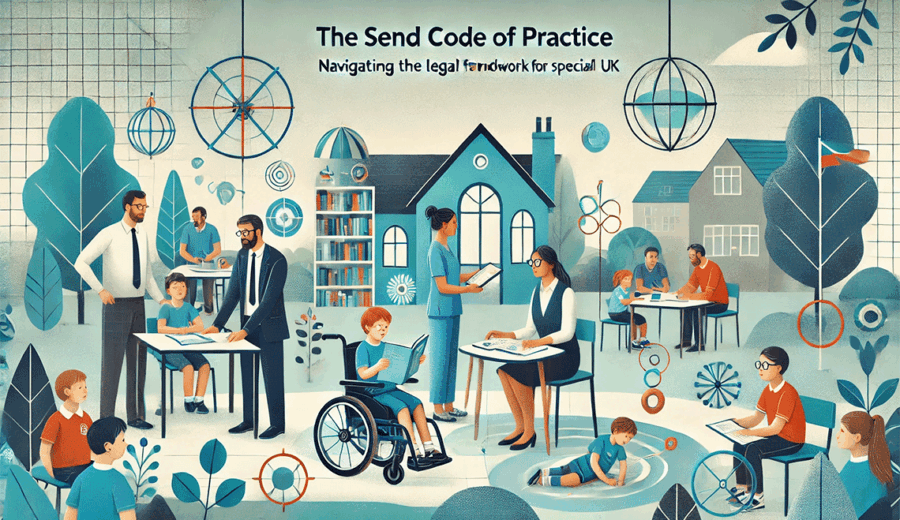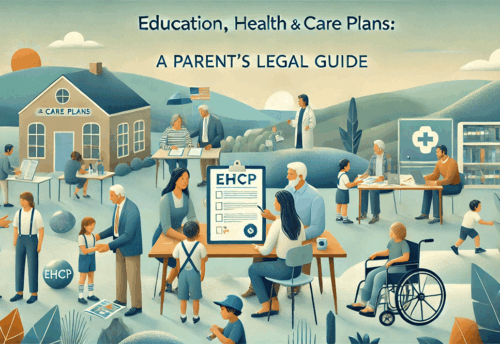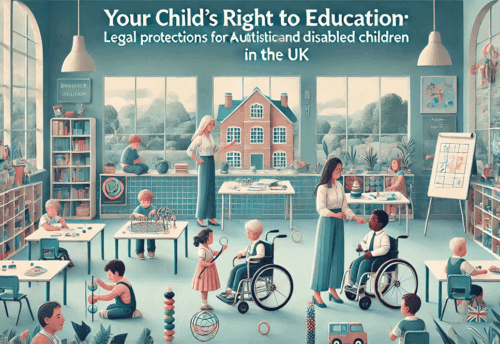
The SEND Code of Practice
The SEND Code of Practice: Navigating the Legal Framework for Special Needs in the UK
The SEND Code of Practice: 0 to 25 Years is a statutory guide in the UK that outlines the legal framework for supporting children and young people with Special Educational Needs and Disabilities (SEND). It provides guidance to local authorities, schools, healthcare providers, and parents on identifying, assessing, and meeting the needs of children with SEND. This Code is rooted in the Children and Families Act 2014 and emphasizes collaboration, inclusivity, and child-centered approaches.
What is the SEND Code of Practice?
The SEND Code of Practice is designed to:
- Ensure all children with SEND have access to high-quality education and support.
- Promote a child-centered and family-focused approach to decision-making.
- Provide clear guidance for professionals and parents about roles and responsibilities.
It applies to children and young people aged 0 to 25 who have learning difficulties, disabilities, or health conditions requiring additional support in education.
Key Principles of the SEND Code of Practice
1. Child-Centered Approach
- Children and young people should be actively involved in decisions about their education and support.
- Parents are equal partners in planning and reviewing their child’s provision.
2. Focus on Outcomes
- The aim is to achieve measurable outcomes in education, health, and social care.
- Plans and support are tailored to help children reach their goals, such as academic progress, independent living skills, or employment readiness.
3. Inclusive Education
- SEND children should be educated in mainstream settings wherever possible, with appropriate support.
- Local authorities and schools must make “reasonable adjustments” to accommodate diverse needs.
4. Collaboration Across Services
- Education, health, and social care services must work together to provide integrated support.
Who Does the SEND Code of Practice Apply To?
The Code provides guidance for:
- Local authorities.
- Schools, colleges, and early years providers.
- Health services, including NHS bodies.
- Social care services.
- Parents and carers.
The Four Areas of SEND
The Code categorizes SEND needs into four broad areas:
- Communication and Interaction: Autism Spectrum Disorder (ASD), speech and language difficulties.
- Cognition and Learning: Learning disabilities like dyslexia or global developmental delay.
- Social, Emotional, and Mental Health (SEMH): Anxiety, ADHD, or behavioral difficulties.
- Sensory and Physical Needs: Visual impairments, hearing impairments, or mobility challenges.
Key Features of the SEND Code of Practice
1. Early Identification and Support
- Schools and early years providers must identify SEND as early as possible.
- Parents can raise concerns if they notice developmental delays or learning challenges.
2. Graduated Approach to SEND Support
The Code introduces a four-step cycle called Assess, Plan, Do, Review:
- Assess: Identify the child’s specific needs through observations and evaluations.
- Plan: Develop a support plan with clear goals and strategies.
- Do: Implement the interventions and strategies outlined in the plan.
- Review: Evaluate progress and adjust the plan as needed.
3. Education, Health, and Care Plans (EHCPs)
- The Code provides detailed guidance on EHCPs, which outline a child’s SEND needs and required support.
- EHCPs are for children whose needs cannot be met through standard school resources.
4. Local Offer
- Local authorities are required to publish a “Local Offer” detailing the SEND support available in their area, including educational placements, therapies, and community services.
5. Preparing for Adulthood
- The Code emphasizes preparing young people for adulthood, including employment, independent living, and participation in society.
The Role of Parents and Carers
The Code recognizes parents as key partners. Parents have the right to:
- Be involved in every stage of their child’s SEND journey.
- Request an EHCP assessment.
- Appeal decisions regarding SEND provision through the First-tier Tribunal.
Parents should also:
- Work closely with schools and local authorities.
- Advocate for their child’s needs during reviews and meetings.
Schools’ Responsibilities Under the Code
- Designated SEND Coordinators (SENCOs):
- Every school must have a SENCO responsible for overseeing SEND provision.
- SEND Support:
- Schools must provide support even without an EHCP.
- Reasonable Adjustments:
- Schools must adapt teaching methods, provide accessible facilities, and offer additional resources as needed.
Local Authorities’ Responsibilities
- Coordinating EHCPs: Local authorities must assess, draft, and review EHCPs.
- Providing the Local Offer: Transparency about available services for SEND families is mandatory.
- Monitoring Schools: Ensure schools meet their obligations under the Code.
Dispute Resolution and Appeals
If parents disagree with decisions about SEND support, the Code outlines steps for resolution:
- Informal Discussions: With schools or local authorities.
- Mediation Services: For resolving disagreements amicably.
- SEND Tribunal Appeals: Parents can challenge decisions about EHCPs, placement, or provision.
How the Code Benefits Children with SEND
- Ensures tailored support that meets individual needs.
- Promotes inclusive practices to reduce stigma and barriers.
- Encourages collaboration among education, health, and social care providers.
Support for Parents
- Parent Carer Forums: Local groups that provide peer support and guidance.
- SENDIASS (Special Educational Needs and Disabilities Information Advice and Support Services): Free advice for navigating SEND processes.
- Charities like IPSEA and Contact: Offer expert legal and practical advice.
Challenges in Implementing the Code
While the Code is comprehensive, some challenges remain:
- Delays in EHCP Assessments: Overburdened local authorities can lead to waiting times.
- Inconsistent Implementation: Schools may vary in how they apply the Code.
- Funding Gaps: Budget constraints can limit available resources.
Solution: Parents should stay informed about their rights and seek advocacy support when necessary.





Leave a Reply